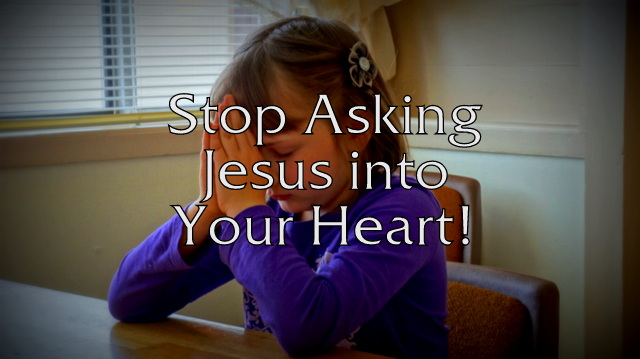God does not save people because they said the “sinners prayer” or because they asked Jesus to come into their heart!
Many assume they are “safe” because they can recall a time, probably in their childhood, when they repeated a prayer or came forward during a church service or maybe they raised their hand when an invitation was given while everyone’s heads were bowed and eyes were closed.
 Unfortunately, they are deceiving themselves! That prayer, that raised hand or even coming forward at the end of the service with tears and true confessions doesn’t mean God has forgiven them!
Unfortunately, they are deceiving themselves! That prayer, that raised hand or even coming forward at the end of the service with tears and true confessions doesn’t mean God has forgiven them!
On the other hand many Christians live with doubt that maybe their faith isn’t real, maybe God hasn’t saved them, maybe they didn’t do it right and maybe they’re headed for eternal punishment after all.
J.D. Greear deals with both of these issues head on in his wonderful little book called “Stop Asking Jesus into Your Heart.” He speaks as a pastor and as one with great experience in dealing with these problems in his own heart. In fact he claims to hold the world record for the most times anyone has asked Jesus into his heart. He also doubted his salvation so much that he was baptized a total of 4 times just to make sure that it was the real thing!
Praying the sinner’s prayer isn’t really wrong, in fact it’s a good thing if it’s done with the heart but we also need to understand that you can be saved without ever uttering the sinners prayer or asking Jesus into your heart.
Greear writes,
“You can ‘ask Jesus into your heart’ without repenting and believing, and you can repent and believe without articulating a request for Jesus to come into your heart.”
“The sinner’s prayer is not a magic incantation or a recipe you follow to get a salvation cake. The real stuff-the stuff that matters-is the posture of repentance and faith behind the words you speak. The prayer is good only insofar as it verbalizes the posture.”
These are important truths for us to remember whether we are sharing the good news of Jesus in Ukraine or in the US. We are calling people to respond to our message in a specific way. Sometimes this may mean that they will pray or come forward but that’s not the important thing.
We must call for heart level repentance and true faith in Jesus!
This is the response called for in the Bible, just check out John 3:36, Acts 16:30-31, Romans 4:5 or Romans 10:9-10
Greear explains it this way,
“Repentance is not simply praying a prayer that acknowledges our sinfulness and asks for forgiveness. Nor is it walking an aisle, signing a card, or giving a public testimony. Repentance is not fundamentally a motion of the hands, mouth or feet; it is a motion of the heart in which we abandon our posture of rebellion and adopt one of submission toward Christ. Repentance is evidenced by an outward action, but it does not equal that.”
“Repentance is not subsequent to belief; it is part of belief. It is belief in action – choices that flow out of conviction.”
If repentance and belief are not the key components we are calling for as we share the gospel then we are leading people astray and giving them a false hope. What it really comes down to is something quite simple, Greear says,
“Salvation comes comes not because you prayed a prayer correctly, but because you have leaned the hopes of your soul on the finished work of Christ.”
 This book is a quick read, (just over 100 pages) and I recommend that you check it out. It is something I’ll have on hand as I think it is a great resource to give to new believers who are struggling to understand the true nature of saving faith. It may also be helpful to give to someone who is still unsure whether he wants to put his faith in Christ and what that means if he does.
This book is a quick read, (just over 100 pages) and I recommend that you check it out. It is something I’ll have on hand as I think it is a great resource to give to new believers who are struggling to understand the true nature of saving faith. It may also be helpful to give to someone who is still unsure whether he wants to put his faith in Christ and what that means if he does.
You can purchase the book on Amazon here and if you do a small percentage comes back to us, so thank you!











floyd
February 12, 2014And here I thought I held the world record for saying the sinner’s prayer! Great point. It’s not about legalism, it can’t be done on the outside, it has to be done on the inside, then the outside shows the results. Amen!
Kimberly A Edwards
February 12, 2014I LOVE this, Caleb.
Caleb
February 12, 2014Thank you Kimberly!
Bill (cycleguy)
February 12, 2014I wasn’t raised in the “sinner’s prayer” mentality at church but was involved in Youth for Christ where I was encouraged in that. I was more into “rededication” which is a whole ‘nother ballgame. Good review Caleb. It is a very convicting book.
Caleb
February 12, 2014Bill, I hadn’t even thought of the rededication aspect. I guess their are similarities. I also remember being asked to rededicate my life at some youth meetings.
Dave Arnold
February 12, 2014Great post Caleb! I read a book similar to the you mentioned called, When the Church was a Family by Jospeh Hellerman. Following Jesus is a lifestyle & proceeds, not fix-all formula.
Caleb
February 12, 2014Sounds like a good book Dave. I think part of the problem in our culture is that people think Jesus is something nice they can just add to their life to make it a little better.
Caleb
February 12, 2014Good thoughts Mia, I agree, this must be an individual response and that is why we can’t force people to believe in Christ, we can and should however plead with them and do our best to explain why they should believe in Jesus.
Dan Black
February 14, 2014This sounds like a good book, it’s going on my book list!
Caleb
February 15, 2014It’s a pretty quick read but good read.
Betty Draper
February 15, 2014I got my hankie out on this one and waving it, saying, amen, amen, amen, preach it my brother.
Caleb
February 15, 2014Thanks for the encouragement Betty!
Barb Raveling
February 17, 2014It sounds like a great book, Caleb. I remember not that long ago believing this but feeling reluctant to say it out loud because no one else was saying it. I’m glad people are starting to write about it (and that I didn’t have to be the one to put myself out there and write about it!). I became a Christian at a David Wilkerson crusade, walking down to the front of a big auditorium, to say the sinner’s prayer – but I continued on after I said it. 🙂
Caleb
February 18, 2014Barb, I’m glad for this book because Greear really does put it together in a simple but clear way. You’re proof that the sinners prayer when said because of a right heart really is a good thing, but we have to be careful that we don’t use it as recipe or proof for belief.
Barb Raveling
February 18, 2014I think it all depends on what you do after you say the prayer. I thought a good title for a book or article on this would be “What if the thief on the cross had lived?”
TCAvey
February 18, 2014Sounds like a great book. I know I used to struggle with this. Satan had me worried I wasn’t really saved. The first four years of my walk with Christ were spent with me doubting my salvation. The problem came from me having a performance based mentality in life. While I knew I couldn’t earn God’s grace, I had a hard time really accepting the fact that He loved me just as I was.
I finally got so tired of living with the fear, that I began asking God to help me. And you know what, He did!!!
He gave me assurance that His love and salvation are eternal. This is one area that satan no longer has a foothold on me.
It’s liberating to finally walk in the grace God provides.
It’s sad that so many Christians struggle with this. I”m glad this book exists to help Christians live victorious in Christ, confident that they belong to Him.
Caleb
February 18, 2014TC, what a great testimony! It’s amazing how often we just simply need to turn to God and ask him for help. He is willing and ready. I’m glad that you don’t struggle with doubt about your salvation any more.
TCAvey
February 18, 2014Me too. It really frees up my prayer life to focus on other things. Satan will use anything to keep us distracted, confused, and living a life less than what God intends.
John 10:10
Nancy Watta
May 1, 2014Not that I have personal doubts that I am saved. BUT lately as a leader I am pondering this topic that you speak of in this post. In fact recently I went back to using Romans 10: 9-10 in a podcast, to be sure people understand salvation in a clear manner. As you mention here, at a heart level.
Caleb
May 2, 2014Nancy, I highly recommend the book I mentioned in this post, it presents things in a very clear and understandable way.
Gary
February 19, 2015At the age of nine I prayed to ask Jesus to come into my heart to be my Lord and Savior. I loved being a Christian. I loved Jesus and I loved the Bible. I used to love witnessing to non-believers and loved defending my belief in (the Christian) God and orthodox/conservative Christianity. Then one day someone challenged me to take a good, hard look at the foundation of my beliefs: the Bible. I was stunned by what I discovered.
1. The Bible is not inerrant. It contains many, many errors, contradictions, and deliberate alterations and additions by the scribes who copied it. The originals are lost, therefore we have no idea what “God” originally” said. Yes, its true—Christians can give “harmonizations” for every alleged error and contradiction, but so can the Muslims for errors in the Koran, and Mormons for errors in the Book of Mormon. One can harmonize anything if you allow for the supernatural.
2. How do we know that the New Testament is the Word of God? Did Jesus leave us a list of inspired books? Did the Apostles? Paul? The answer is, no. The books of the New Testament were added to the canon over several hundred years. Second Peter was not officially accepted into the canon until almost the FIFTH century! So why do all Christians accept every book of the New Testament as the word of God and reject every non-canonical “gospel”? Answer: the ancient (catholic) Church voted these books into your Bible. Period.
There is nowhere in the OT or the NT where God gives men the authority to determine what is and what is not his Word. If Second Peter was really God’s Word, the entire Church should have known so in the first century.
3. Who wrote the Gospels? We have NO idea! The belief that they were written by Matthew, Mark, Luke, and John is based on hearsay and assumptions—catholic tradition. Protestants denounce most of the traditions of the Catholic Church but have retained two of the most blatant, evidence-lacking traditions which have no basis in historical fact or in the Bible: the canon of the NT and the authorship of the Gospels.
The only shred of evidence that Christians use to support the traditional authorship of the Gospels is one brief statement by a guy named Papias in 130 AD that someone told him that John Mark had written a gospel. That’s it! Papias did not even identify this “gospel”. Yet in 180 AD, Irenaeus, a bishop in FRANCE, declares to the world that the apostles Matthew and John and the associates of Peter and Paul—Mark and Luke—wrote the Gospels. But Irenaeus gives ZERO evidence for his assignment of authorship to these four books. It is well known to historians that it was a common practice at that time for anonymously written books to be ascribed to famous people to give them more authority. For all we know, this is what Irenaeus did in the case of the Gospels.
The foundation of the Christian Faith is the bodily resurrection of Jesus. If the story of the Resurrection comes from four anonymous books, three of which borrow heavily from the first, often word for word, how do we know that the unheard of, fantastically supernatural story of the re-animation of a first century dead man, actually happened??
Maybe the first book written, “Mark”, was written for the same purpose that most books were written in that time period—for the benefit of one wealthy benefactor, and maybe it was written simply as an historical novel, like Homer’s Iliad; not meant to be 100% factual in every detail, but a mix of true historical events as a background, with a real messiah pretender in Palestine, Jesus, but with myth and fiction added to embellish the story and help sell the book! We just do not know for what purpose these books were written!
I slowly came to realize that there is zero verifiable evidence for the Resurrection, and, the Bible is not a reliable document. After four months of desperate attempts to save my faith, I came to the sad conclusion that my faith was based on an ancient superstition; a superstition not based on lies, but based on the sincere but false beliefs of uneducated, superstitious, first century peasants.
You can pray to ask Jesus into your heart 10,000 times, but if there is no evidence for his Resurrection, then odds are that he is dead. And if he is dead, he can’t hear your prayers. Sad, but the truth.